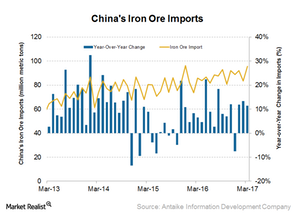China’s Iron Ore Imports Remain Strong: What’s the Outlook?
Strong Chinese iron ore imports China imported 95.6 million tons of iron ore in March, compared with 83.5 million tons in February 2017. This figure implies a strong growth of 11% year-over-year (or YoY). This number is also the second-highest monthly amount on record. China imported 96.3 million tons of iron ore in December 2015. […]
April 24 2017, Updated 7:37 a.m. ET

Strong Chinese iron ore imports
China imported 95.6 million tons of iron ore in March, compared with 83.5 million tons in February 2017. This figure implies a strong growth of 11% year-over-year (or YoY). This number is also the second-highest monthly amount on record. China imported 96.3 million tons of iron ore in December 2015.
In 1Q17, iron ore imports grew by 12% to 271 million tons, which is a quarterly record. Steel imports have been strong in China, mainly due to buoyant steel prices. Investors should note that the strong demand is in contrast to what many market participants expected. China’s iron ore imports were also quite robust in 2016 and hit a yearly record. China’s 2016 iron ore imports came in at 1.0 billion tons, an annual rise of 7.5%.
Resilient demand
This rise was the result of two factors: resilient steel demand in China partly driven by government stimulus measures, and the replacement of Chinese domestic iron ore production due to the import of cheaper high-grade ore imports from Australia and Brazil.
While this high demand for ore kept prices of the raw material firm in 2016 and 1Q17, it has now led to a decline in iron ore prices. High imports are leading to ballooning inventories at ports.
Customs data and China’s iron ore imports
China tracks its iron ore imports through customs data. This information is important for investors because it provides a good idea of the demand for imported iron ore among Chinese mills and traders. China consumes more than two-thirds of all seaborne iron ore, so Chinese demand affects seaborne iron ore players such as Cliffs Natural Resources (CLF), Vale (VALE), and Rio Tinto (RIO).
The iShares MSCI Global Metals & Mining Producers ETF (PICK) invests in iron ore. BHP Billiton (BHP) is PICK’s top holding, making up 16.7% of the fund. The SPDR S&P Metals & Mining ETF (XME) also invests in some of the above stocks. In the next part of this series, we’ll discuss what’s supporting the current trend in steel production in China.
